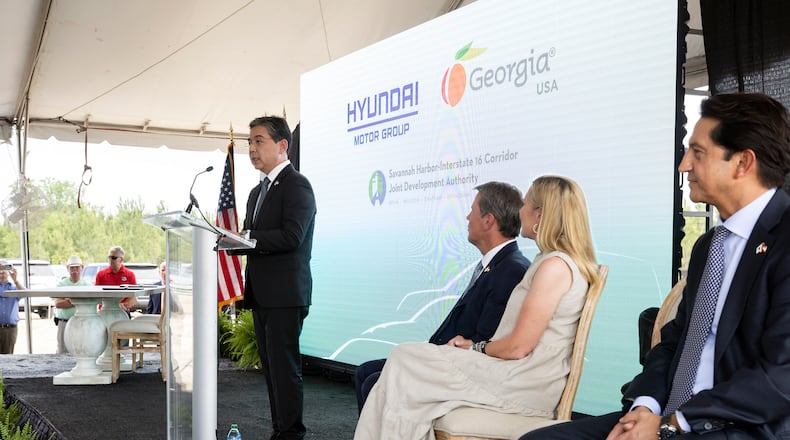A joint development authority near Savannah voted Tuesday afternoon to approve an “economic development agreement” for automotive giant Hyundai Motor Group’s planned electric vehicle factory.
Details of the agreement were not released, as it has not been signed by the state or Hyundai, but officials say it’s a major step for the project that allows the company to begin making improvements to the roughly 3,000-acre property near the Georgia coast. The project’s director said it’s a “daunting” schedule to prepare the $5.5 billion plant to open in 2025. But he said the project so far is on track.
The Savannah Harbor-Interstate 16 Corridor Joint Development Authority (JDA) was the first to sign the deal, and it’ll be made public once the state and Hyundai have added their signatures. That’s expected to take place by Friday, according to Hugh “Trip” Tollison, president and CEO of the Savannah Economic Development Authority.
Georgia and many states negotiate incentive packages in secret and only make them public once approved.
The benefits package will likely rival the $1.5 billion worth of tax breaks and other incentives offered to Rivian to build a factory east of Atlanta, the most lucrative package of inducements the state has ever offered. In exchange for Rivian transforming a nearly 2,000-acre tract between Social Circle and Rutledge into a $5 billion manufacturing plant, the state offered free land, a state-owned training center, a new interchange along I-20 and a bounty of local and state tax breaks.
Hyundai’s incentives package could be even greater, since the company’s plant is expected to generate roughly 600 more jobs than Rivian’s project. Both electric vehicle company announcements have been touted by Gov. Brian Kemp as the largest economic development projects in Georgia history.
“As you know, there’s an international race to capture the EV market around the globe,” Eric Johnson, the JDA’s project director, said during Tuesday’s meeting. “We’re lucky to have landed a strong customer.”
The factory will be located along I-16 near the Ellabell community, about 30 minutes west of Savannah. Hyundai officials said the factory, which will make EVs and batteries, eventually could employ about 8,100 workers.
Hyundai Motor subsidiary Kia already has a plant in West Point with a network of suppliers. State officials said the parent company has committed to $1 billion in investments from its supplier network, which could lead to thousands of additional jobs.
Tuesday’s vote by the JDA, a government authority that oversees the Hyundai project site, is the largest step so far in delivering the factory. Johnson said the Bryan County Commission has already rezoned part of the property, approved a road closure and made way for grading work to begin. A wetland permit is also “on track,” Johnson added.
The authority approved a $65.8 million contract with multiple Georgia construction companies to begin grading the property. Tollison said they received three bids, all of which were under budget. Thomas & Hutton was also hired to design a road from U.S. 280 to the project site, a critical access point.
Previously filed state paperwork shows the project’s scope includes 11 manufacturing buildings along with “road, water, and sewer extensions to access and serve the facility.” Bryan County also plans a substantial expansion to its water and wastewater systems, including a new water tower and miles of piping to service the EV factory, documents show.
In addition to the economic development agreement, the JDA board approved how revenue will be shared by the counties affected by the project. Details were not released, but with Rivian, the state and a local JDA in the Social Circle area approved a long-term rental agreement that included more than $700 million in local property tax savings for the EV maker.
In exchange, Rivian agreed to a payment in lieu of taxes agreement in which the company will pay more than $300 million to local governments, a substantial reduction in tax liability, which a vocal opposition group has criticized as a giveaway at the expense of local taxpayers.
State officials argue these massive agreements full of taxpayer-backed incentives are necessary to attract massive investments from companies and relatively high-paying manufacturing jobs that have the potential to transform surrounding communities. However, government watchdogs and tax hawks worry states like Georgia are paying an exorbitant cost to avoid missing out on the potential of an electric vehicle revolution.
“We’re worried that a lot of states are overspending right now at a time when lots of people think there’s going to be a recession and tax revenues will go back down,” Greg LeRoy, executive director of the watchdog group Good Jobs First, told The Atlanta Journal-Constitution.
In just the last few years, three of Georgia’s biggest recruitment projects ever have all been related to electric vehicles. In 2018, the state landed a battery plant from South Korean conglomerate SK Innovation, which received a state incentive package worth $300 million.
LeRoy said he anticipates the Hyundai package will be comparable to the Rivian offer. If so, he said Georgia “will hold the dubious distinction of having the two costliest auto plan deals in U.S. history.”
The authority said a groundbreaking ceremony will be held this fall. Hyundai officials expect the factory to have a capacity to produce 300,000 EVs a year.
A note of disclosure
Cox Enterprises, owner of the AJC, owns about a 4% stake in Rivian and supplies services to it. Sandy Schwartz, a Cox executive who oversees the AJC, is on Rivian’s board of directors and holds stock personally. He does not take part in the AJC’s coverage of Rivian.
About the Author
Keep Reading
The Latest
Featured



